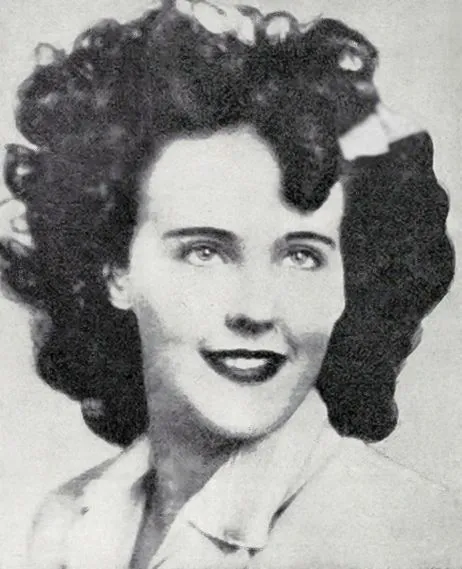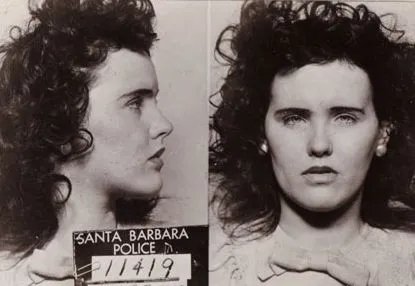 Elizabeth Short was just 22 years old at the time of her murder.
Elizabeth Short was just 22 years old at the time of her murder.
 Elizabeth Short was just 22 years old at the time of her murder.
Elizabeth Short was just 22 years old at the time of her murder. Elizabeth Short, known as Beth to her friends and later the Black Dahlia due to her wearing black clothing and jet-black dyed hair, was born on July 29th, 1924 and died late in the evening of January 14th (or very early in the morning of January 15th), 1947 at the age of 22. She was called the Black Dahlia after her death because of the gruesome nature of the crime. Her cause of death was officially listed as Cerebral Hemorrhage, resulting from homicidal violence.
The Dahlia case remains unsolved, and is one of Los Angeles California's oldest murder mysteries. It was also one of the first major crimes in post World War II America to catch the nation's attention.
The body was discovered by a young Los Angeles woman and her 3 year old daughter in a vacant lot on the morning of January 15th, 1947. The woman thought the body was a mannequin at first, due to the white pallor of the skin and the position of the body. When she realized it was a human body, she rushed to a nearby store to call the police.
The seasoned police officers who first arrived at the scene, were shocked at the savagery the body had endured. The body was lying in some weeds towards the edge of the sidewalk. It was the nude, mutilated halves of a female corpse (cut at the waist). It had rope burns on the wrists and ankles. Pre-mortem torture included cuts to the breast area of her body, as well as the letters B.D. carved into her left thigh. The body was expertly bisected, drained of blood, and also washed - along with her hair.
 Above: Mugshots from Short's underage drinking arrest.
Above: Mugshots from Short's underage drinking arrest.
 Above: Mugshots from Short's underage drinking arrest.
Above: Mugshots from Short's underage drinking arrest. The officers came to the conclusion that the body had been dumped before dawn in the Leimert Park neighborhood of Los Angeles. Prior to the autopsy, the police had quickly been able to identify the victim as Elizabeth Short by sending a copy of her finger prints to the FBI in Washington D.C. through means of Soundphoto, a primitive fax machine of the era. Ms. Short had been arrested in 1943 for underage drinking, so her prints were on file.
A person claiming to be the killer, contacted the press by phone. Similarly, another person would later contact police several times by mail, and claim to have killed Ms. Short. The letters the killer sent, used cutout letters from magazines and newspapers. The killer also sent police Ms. Short's birth certificate, business cards, photographs, names written on a piece of paper, and an address book with a man's name embossed on the front cover. The packet containing the above named items, had been cleaned with gasoline similarly to the body. Other item's believed to be Ms. Short's were in an ally near the body. They had been wiped clean with gasoline as well. The police tried to recover partial prints found on some of the items, but were limited by the technology of the period.
Initially, a total of 750 investigators from the L.A.P.D and other departments worked on the case. A $10,000 reward was posted by a city councilmen, resulting in an influx of false tips and confessions.
After researching the old suspects, including some I found ridiculous and newer suspects, I found some seasoned suspects who sources have claimed to be quite viable. According to Black Dahlia Avenger: A Genius for Murder, 2003, George Hodel was a physician and one of the five prime suspects. Police had gathered enough evidence to place Dr. Hodel under arrest when he fled the country, until his return in 1990. Hodel's own son, Steve (a former L.A.P.D Homicide detective) believed that his father had murdered Short and many others. A 2006 episode of Cold Case Files laid out Steve Hodel's theory that had been explained in the book listed above. L.A.P.D's head deputy and D.A. felt that Stephen Short's research had solved the case.
Thanks for reading this! I think this case will never truly be solved, which is tragic. A heinous crime, the brutal murder of such a beautiful young lady deserves to be solved.
Sources
(1) Time Life Books, True Crime Series, Unsolved Crimes page 92
(2) Gilmore, 2006, pages 137 - 138
(3) Wikipedia (Black Dahlia)
(4) Wikipedia (Black Dahlia Suspects)
(5) Wikipedia (George Hill Hodel)
All Images are in the public domain, and taken from source number (3)
If you enjoyed this, I posted my introduction post yesterday. You can find it here.